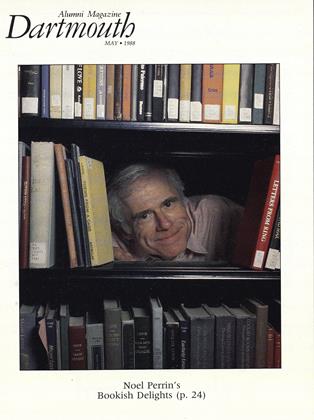For years, people have wondered whether the Dartmouth Alumni Magazine should be in the business of selling advertising space to groups with special causes. The Board of Trustees asked the same question in 1980, and it devised an answer that we believe applies today. We quote the statement in full:
"The Alumni Magazine has a long tradition of accepting such advertisements so long as they are truthful and in good taste. The reason for accepting such advertising should be self-evident: 'Such a policy,' Charlie Widmayer wrote in 1973, 'has simply been a case of practicing what the College preaches about being an open marketplace for the free and uncensored exchange of ideas and expression of opinion.' That being understood, however, it is not appropriate to the purposes of the Magazine to accept advertising which attacks individuals for their views or actions or which impugn the character or objectives of individuals or groups."
This doctrine is currently being tested by the Ernest Martin Hopkins Institute, a small, independent group of alumni. In- stead of submitting a single ad as had pre- vious interest groups, the Institute says it intends to book two full pages every month. The March issue, for example, contained an advertisement titled, "The Purpose of Dart- mouth College," along with one headed, "Women's Issues at Dartmouth College." The women's issues ad caused some con- troversy among men and women who felt that the text seriously misrepresented the status of coeducation at Dartmouth. In- deed, the ad was found to contain several inaccuracies such as the false claim that "feminist housing" has been created, and that feminists have hosted "pornographic film festivals." See the response on page 6 by Mary Turco, acting dean of Residential Life.
Some people questioned whether the magazine, in accepting the coeducation ad, had violated the Trustees' standards of "truthfulness" and "good taste." Clearly, those terms are open to interpretation. The editors have chosen to interpret them as narrowly as possible. We have rejected only those advertisements that contain glaring factual errors (that we are able to catch be- fore going to press), along with ads that attack the character of individuals or groups. So far we have refused to run three of the Hopkins Institute's advertisements. One on gays violated the standards of good taste. The second, on Dartmouth's bureau- cracy, quoted a 1972 statement by a profes- sor in a way that made it appear as though he was speaking about the current admin- istration; this seemed "untruthful" in our opinion. The third claimed falsely that "to- kenism and quotas have been utilized" in recruiting students.
However, we will continue to accept ads by the Hopkins Institute, even when they risk offending some groups on campus, so long as the language falls under our inter- pretation of the Trustees' statement. We do so with three assumptions:
• The right to buy advertising space is open to virtually every organization, and the same standards apply to everyone.
• We will do our best to print rebuttals as soon as possible.
• We assume that the readers are dis- cerning enough to distinguish between paid advertising and editorial matter.
 View Full Issue
View Full Issue
More From This Issue
-
 Cover Story
Cover StoryJonathan Corncob and Other Almost Classics
May 1988 By Noel Perrin -
 Feature
FeatureRunning with the Big Boys
May 1988 By Mike Fadil '85 -
 Feature
FeatureAt Dartmouth, the Intellectual Is on the Margin
May 1988 By Karen Avenoso '88 -
 Feature
FeatureDear President Freedman...
May 1988 By Tom Bloomer '53 -
 Article
ArticleAlumni Writers Approve Review's Tongue-Lashing
May 1988 -
 Lettter from the Editor
Lettter from the EditorResponse: The Real Women's Issues
May 1988 By Mary G. Turco
THE EDITORS
-
 Article
ArticleThat Old War Cry!
December 1934 By The Editors -
 Article
ArticlePrinceton Won This One
December 1934 By The Editors -
 Article
ArticleJanitors
January 1935 By The Editors -
 Article
ArticleOf Much Promise
February 1935 By The Editors -
 Article
ArticleTwenty-Five Cents!
April1935 By The Editors -
 Feature
FeatureTales For Late Summer
June 1992 By The Editors
Lettter from the Editor
-
 Lettter from the Editor
Lettter from the EditorEditorial Comment
NOVEMBER 1929 -
 Lettter from the Editor
Lettter from the EditorEditorial Comment
January, 1931 -
 Lettter from the Editor
Lettter from the EditorLetter From London
May 1944 -
 Lettter from the Editor
Lettter from the EditorDouble Vision
MARCH • 1985 By Douglas Greenwood -
 Lettter from the Editor
Lettter from the EditorContinuing Education
APRIL • 1985 By Douglas Greenwood -
 Lettter from the Editor
Lettter from the EditorPublic or Private Schools: A Letter to the Editor
MAY 1932 By Louis P. Benezet

